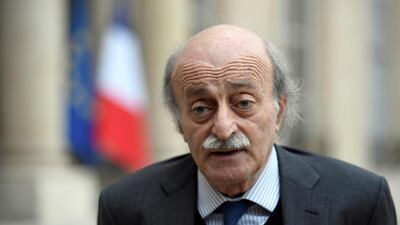Lebanon’s Druze leaders clashed on Twitter at the weekend over what appeared to be Syrian interference against their authority.
But later those officials abruptly deleted the messages and urged supporters to remain calm.
Last week, unconfirmed reports said that Syria blocked access to any Lebanese Druze leader who tried to enter the country without an ID card signed by Sheikh Nasreddine Al Gharib, who is close to pro-Syrian Druze politicians.
The religious leader of those in Lebanon is Sheikh Naim Hassan, head of the Druze Spiritual Council, who is supported by Lebanon’s main Druze leader and relentless critic of Damascus, Walid Jumblatt.
The small religious community is concentrated in mountainous regions in Lebanon, southern Syria and parts of northern Israel.
Although it carries significant political weight, the Druze population of Lebanon and Syria is estimated at fewer than a million people.
Mr Jumblatt jumped into the argument, tweeting that Sheikh Al Gharib should “stay away from roles that are not worthy of him”.
Mr Jumblatt also compared the religious figure to Rustom Ghazaleh, who led Syrian military intelligence in Lebanon between 2002 and 2005 when the occupation ended with mass protests.
Industry Minister Wael Abu Faour, a member of Mr Jumblatt’s Progressive Socialist Party, criticised the Syrian decision as “further evidence to the return of the regime to its previous practices of intervention in internal Lebanese affairs”.
Then the Lebanese Democratic Party, Mr Jumblatt’s main rival, rallied to Syria’s defence.
Founded by Talal Arslan, the party said Syria had “protected our sheikhs’ security and reputation”.
It said some people crossing into Syria from Lebanon had been posing as religious officials and wearing Druze sheikhs’ attire.
Jad Haidar, head of communications of the LDP, told Lebanon's The Daily Star that it was reciprocal.
"Syrian sheikhs have long been required to carry a similar special ID card when entering Lebanon," Mr Haidar said.
Syria has historically played an important role in local politics, although its influence weakened after the outbreak of the civil war in 2011.
But as Bashar Al Assad’s regime consolidates its grip at home, Lebanese politicians aligned with Damascus, such as Mr Arslan and former Druze minister Wiam Wahhab, have become increasingly vocal about a return to Lebanon.
Mr Arslan defended Sheikh Al Gharib on Twitter, saying he was “more legitimate than all the corrupt thieves who wear religious clothing to cover their sins”, in a clear jab at Mr Jumblatt.
But by Saturday evening, all three Druze leaders had deleted their tweets and were saying that the community’s sheikhs had intervened and asked them to take a step back to calm tension.
It Is not uncommon for intercommunal Druze disputes to flare up but it can have deadly consequences.
Last December, Mr Wahhab insulted Lebanese Prime Minister Saad Hariri as he struggled to form a government. Mr Hariri is part of the anti-Syrian political bloc.
When the Internal Security Forces tried to bring him in for questioning, his supporters opened fire and one of them was killed.
To Mr Jumblatt’s outrage, Sheikh Al Gharib and Sheikh Hassan were also invited to the Arab economic summit organised in the Lebanese capital in late January.
The office of President Michel Aoun, which issued the invitation, argued that inviting Sheikh Al Gharib did not constitute a snub to the Druze leadership despite him not being a recognised community head.


